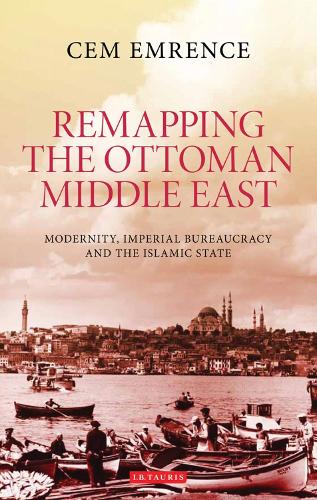
Remapping the Ottoman Middle East: Modernity, Imperial Bureaucracy and Islam
(Paperback)
Publishing Details
Remapping the Ottoman Middle East: Modernity, Imperial Bureaucracy and Islam
By (Author) Cem Emrence
Bloomsbury Publishing PLC
I.B. Tauris
30th January 2016
United Kingdom
Classifications
Tertiary Education
Non Fiction
956.10154
Physical Properties
Paperback
208
Width 136mm, Height 216mm, Spine 16mm
240g
Description
As a result of the formation of the modern Turkish state, nationalist narratives of the Ottoman Empire's collapse are commonplace. Remapping the Ottoman Middle East, on the other hand, examines alternative and disparate routes to modernity during the nineteenth century. Pursuing a comparison of different regions of the empire, this book demonstrates that the Ottoman imperial universe was shaped by three distinct and simultaneous narratives: market relations in its coastal areas; imperial bureaucracy in the cities of central Anatolia, Syria and Palestine; and Islamic trust networks in the frontier regions of the Arabian Peninsula. In weaving together these localized developments, Cem Emrence departs from narratives of state centralism and suggests that a comprehensive way of understanding the late Ottoman world and its legacy should start from exploring regionally-constituted and network-based historical trajectories. Introducing a persuasive new model for understanding the late Ottoman world, this book will be essential reading for historians of the Ottoman Empire.
Reviews
'In Remapping the Ottoman Middle East, Cem Emrence analyzes the paradigms in which late ottoman history has been written. His original contribution is the conceptualisation of the body of work produced in recent decades on social and cultural history, and the analysis of the latter's linkages to the earlier currents of modernisation and dependency studies. Emrence approaches the relatively new trend under the rubric of bargaining perspectives, repositions its relationship to the centre and 'macro' trends, but goes beyond binary constructs such as centre-periphery and state-society by investigating multi-faceted networks on the regional and imperial level. The combination of synthetic and analytical skills Emrence displays in his work is remarkable. He has internalised a vast body of historical literature, which he skilfully and creatively distils through the lens of social scientific concepts and categories. The result is a significant contribution to late Ottoman Studies.' --Hasan Kayali, Associate Professor of History, University of California 'Cem Emrence has an excellent mastery of the historical and theoretical literature, and an elegant and genuinely novel model of the social transformation of imperial populations. He argues that there were parallel and alternative forces in the different geographies of the Ottoman Empire, impelling different forms of negotiation both with the centre and with european imposition. This book is an important contribution to the growing field of the historical sociology of empires and a milestone in Ottoman Studies.' --Caglar Keyder, Professor of Sociology, Binghamton University, SUNY
Author Bio
Cem Emrence is a post-doctoral fellow of history at the University of Massachusetts-Amherst. His research focuses on the Ottoman Empire and modern Turkey. His work has appeared in many academic journals including the Journal of Global History, Middle East Studies Association Bulletin, Middle Eastern Studies, Turkish Studies and Comparative Sociology. He teaches courses on the Ottoman Empire, Comparative Empires and the Modern Middle East among others.
